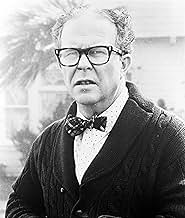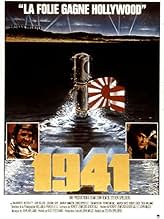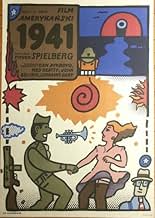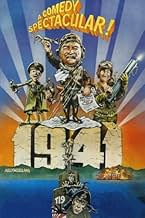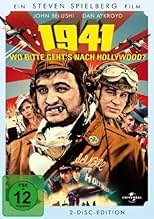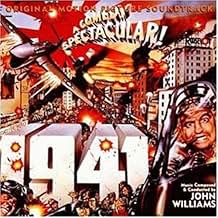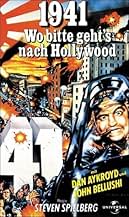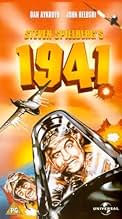VALUTAZIONE IMDb
5,8/10
37.737
LA TUA VALUTAZIONE
I californiani isterici si preparano per un'invasione giapponese nei giorni successivi a Pearl Harbor.I californiani isterici si preparano per un'invasione giapponese nei giorni successivi a Pearl Harbor.I californiani isterici si preparano per un'invasione giapponese nei giorni successivi a Pearl Harbor.
- Regia
- Sceneggiatura
- Star
- Candidato a 3 Oscar
- 6 candidature totali
Toshirô Mifune
- Cmdr. Akiro Mitamura
- (as Toshiro Mifune)
Lucille Benson
- Gas Mama (Eloise)
- (as Lucille Bensen)
Jordan Cohen
- Macey Douglas
- (as Jordan Brian)
Elisha Cook Jr.
- The Patron (Dexter)
- (as Elisha Cook)
Recensioni in evidenza
1941 is a unique movie. 1 part of it is animal house-esque lowbrow humor, 1 part is B-movie love story, and 1 part stoic war movie, and 2 parts insane hilarity.
It is a weird mix to say the least.
First, the problems: 1. The first half of the movie is slow. It grinds on making you wonder why you're watching this movie.
2. The "Love story" subplot is poorly executed for what this movie is trying to do.
3. many of the actors are not used to their fullest potential (especially Dan Akroyd and John Candy) while others receive excessive screen time. (see: The slow moving love story sub-plot) But then there are the good aspects: 1. John Belushi is hilarious. He would have been funnier had he interacted with more characters rather than appearing in many solo shots, but he was funny.
2. The "Epic Battle" was great. It had me laughing as my sides hurt.
3. Slim Pickens: His appearance in the movie was truly where the movie stopped being slow, and the fun really started. He was great in his scenes and between the dialogue and his visual scenes, you can't help but laugh.
There's more, but in short, if you don't mind sitting through a slow build up, the payoff is worth the wait.
It's not the best movie ever, but in the barren entertainment landscape that is Weekend Television: Finding this movie can be like an oasis in the desert. It's solid Saturday afternoon fun.
It is a weird mix to say the least.
First, the problems: 1. The first half of the movie is slow. It grinds on making you wonder why you're watching this movie.
2. The "Love story" subplot is poorly executed for what this movie is trying to do.
3. many of the actors are not used to their fullest potential (especially Dan Akroyd and John Candy) while others receive excessive screen time. (see: The slow moving love story sub-plot) But then there are the good aspects: 1. John Belushi is hilarious. He would have been funnier had he interacted with more characters rather than appearing in many solo shots, but he was funny.
2. The "Epic Battle" was great. It had me laughing as my sides hurt.
3. Slim Pickens: His appearance in the movie was truly where the movie stopped being slow, and the fun really started. He was great in his scenes and between the dialogue and his visual scenes, you can't help but laugh.
There's more, but in short, if you don't mind sitting through a slow build up, the payoff is worth the wait.
It's not the best movie ever, but in the barren entertainment landscape that is Weekend Television: Finding this movie can be like an oasis in the desert. It's solid Saturday afternoon fun.
Steven Speilberg once asked a friend of mine, "Why didn't anyone like this movie?" Well, I think that I can answer that - "1941" is a gigantic in-joke. The people who are in on the joke are people who, like myself, have an oversized love and knowledge of the city of Los Angeles and it's history. I think that in the vast, world-wide movie-going public, this group probably comprises 1%. For that group, "1941" has a wonderful nostalgia value. And for the people in that 1% that have a twisted sense of humor and enjoy seeing nostalgic L.A. blown to bits, this movie really delivers. By the way, the folks with that twisted sense of humor probably account for about 1% of the original 1%.
I don't know why, but having grown up in L.A. and being an aficionado of it's history, I find it funny to see planes in a dogfight over Hollywood Blvd, the ferris wheel rolling off the end of Santa Monica Pier, and aircraft crashing into the La Brea Tarpits. But for non-locals and people unfamiliar with the paranoia that gripped Southern California in the wake of Pearl Harbor, this movie will likely seem confusing and silly. To the history buff with a twisted sense of humor (like me, proud member of the 1% of the 1%), the movie is not only amusing, but sometimes surprisingly accurate, historically. Robert Stack plays General Joseph Stillwell - a very real historical figure in L.A. history. Stack even bears a striking resemblance to the real General Stillwell. The whole movie is based upon a few real-life incidents of panicky anti-aircraft fire that occurred over L.A. in 1941/1942, as well as a Japanese sub that actually shelled an oil refinery near Santa Barbara. Like "Chinatown" (a film mistakenly thought to be an accurate account of L.A. water politics in the 1930s), "1941" borrows from real-life history and distorts it into pure fabrication. The difference is that while "Chinatown" is a noir drama, "1941" is an over-the-top comedy. Both films appeal to the historian, but as it is often said, comedy is much harder to pull off than drama. You either love "1941", or sit though it, saying, "huh?".
I don't know why, but having grown up in L.A. and being an aficionado of it's history, I find it funny to see planes in a dogfight over Hollywood Blvd, the ferris wheel rolling off the end of Santa Monica Pier, and aircraft crashing into the La Brea Tarpits. But for non-locals and people unfamiliar with the paranoia that gripped Southern California in the wake of Pearl Harbor, this movie will likely seem confusing and silly. To the history buff with a twisted sense of humor (like me, proud member of the 1% of the 1%), the movie is not only amusing, but sometimes surprisingly accurate, historically. Robert Stack plays General Joseph Stillwell - a very real historical figure in L.A. history. Stack even bears a striking resemblance to the real General Stillwell. The whole movie is based upon a few real-life incidents of panicky anti-aircraft fire that occurred over L.A. in 1941/1942, as well as a Japanese sub that actually shelled an oil refinery near Santa Barbara. Like "Chinatown" (a film mistakenly thought to be an accurate account of L.A. water politics in the 1930s), "1941" borrows from real-life history and distorts it into pure fabrication. The difference is that while "Chinatown" is a noir drama, "1941" is an over-the-top comedy. Both films appeal to the historian, but as it is often said, comedy is much harder to pull off than drama. You either love "1941", or sit though it, saying, "huh?".
I have a sneaking suspicion that Steven Spielberg must have seen and loved It's A Mad Mad Mad Mad World as a sixteen year old kid and resolved that if he became as big a movie name as Stanley Kramer he'd do a film just like it. In 1979 Spielberg succeeded admirably creating a chaotic classic about a very serious time.
I doubt we're ever going to be ready for decades for a film like this about the days following the Twin Towers. Those were pretty scary days, especially on the Pacific coast where our fleet with the remarkable exception of the carriers was at the bottom of Pearl Harbor and who really knew where and how many the Japanese were following the attack in Hawaii.
It should give you cold chills to think that if it was more than Toshiro Mifune lost submarine with German observer Christopher Lee on it that they would have been met with what we see in 1941. At the time our home defense on the Pacific Coast was commanded by Major General Joseph L. Stillwell known to all as Vinegar Joe. But he could be moved as we see as he takes in a screening of Dumbo which did come out around that time.
Like It's A Mad Mad Mad Mad World the cast it populated with some of the great comedians and comic players of the time. At some point or other they all intersect in their comic defense of California under attack from the Japanese as surely as the world was under attack from Orson Welles's broadcast of War Of The Worlds.
There are a lot of memorable performances where some serious players got to show a comic side and really get unrestrained. One example would be crazy National Guard colonel Warren Oates meeting up with equally crazy would be air ace John Belushi. Slim Pickens saves California by his Faux constipation, he really goes unrestrained. Tim Matheson as Stilwell's aide is as horny as he was in Animal House as he maps out a campaign to nail aviation buff Nancy Allen and winds up midair in a plane he knows not how to fly.
Robert Stack plays Vinegar Joe Stilwell the only true character in 1941 and he plays it straight as a string. If he survived this bunch of lunatics, how come he couldn't get Chiang Kai-Shek off his duff and fight those Japanese who were really invading his country? Maybe duty in the Far East was a welcome relief for Stilwell, but not for long.
Be eternally grateful that this was NOT the way it was in 1941 and sit back and enjoy.
I doubt we're ever going to be ready for decades for a film like this about the days following the Twin Towers. Those were pretty scary days, especially on the Pacific coast where our fleet with the remarkable exception of the carriers was at the bottom of Pearl Harbor and who really knew where and how many the Japanese were following the attack in Hawaii.
It should give you cold chills to think that if it was more than Toshiro Mifune lost submarine with German observer Christopher Lee on it that they would have been met with what we see in 1941. At the time our home defense on the Pacific Coast was commanded by Major General Joseph L. Stillwell known to all as Vinegar Joe. But he could be moved as we see as he takes in a screening of Dumbo which did come out around that time.
Like It's A Mad Mad Mad Mad World the cast it populated with some of the great comedians and comic players of the time. At some point or other they all intersect in their comic defense of California under attack from the Japanese as surely as the world was under attack from Orson Welles's broadcast of War Of The Worlds.
There are a lot of memorable performances where some serious players got to show a comic side and really get unrestrained. One example would be crazy National Guard colonel Warren Oates meeting up with equally crazy would be air ace John Belushi. Slim Pickens saves California by his Faux constipation, he really goes unrestrained. Tim Matheson as Stilwell's aide is as horny as he was in Animal House as he maps out a campaign to nail aviation buff Nancy Allen and winds up midair in a plane he knows not how to fly.
Robert Stack plays Vinegar Joe Stilwell the only true character in 1941 and he plays it straight as a string. If he survived this bunch of lunatics, how come he couldn't get Chiang Kai-Shek off his duff and fight those Japanese who were really invading his country? Maybe duty in the Far East was a welcome relief for Stilwell, but not for long.
Be eternally grateful that this was NOT the way it was in 1941 and sit back and enjoy.
Any movie that features the following....:
1. The Geek from "I Wanna Hold Your Hand" torturing The Mayor from "Jaws" 2. A bunch of Japanese soldiers disguised as walking Christmas Trees 3. A hilarious USO dance sequence that boils over into an inter-service street fight 4. the film debut of Mickey Rourke and the big film debut of John Candy
and last but not least
5. Tough guy Robert Stack crying and singing along to songs from the Disney classic "Dumbo".....
CANNOT BE ALL BAD!!!!!
1. The Geek from "I Wanna Hold Your Hand" torturing The Mayor from "Jaws" 2. A bunch of Japanese soldiers disguised as walking Christmas Trees 3. A hilarious USO dance sequence that boils over into an inter-service street fight 4. the film debut of Mickey Rourke and the big film debut of John Candy
and last but not least
5. Tough guy Robert Stack crying and singing along to songs from the Disney classic "Dumbo".....
CANNOT BE ALL BAD!!!!!
As outlandish and hysterical as the war insanity of 1941 may seem, the plot tracks almost exactly a real incident reported the night of Feb. 24, 1942, in Los Angeles that began when Navy intelligence reported an attack by unidentified objects on their radar could be expected within the next 10 hours. Early the morning of the 25, radar tracked objects 120 miles west of Los Angeles and a blackout was ordered, triggering a flood of reports about enemy planes. Planes wre reported by the coast artillery near Long Beach (25 of them at 12,000 feet). Four batteries of anti aircraft guns at Santa Monica opened fire on a balloon with a flare and all hell broke loose, with so much ack-ack and searchlights scanning the sky that utter confusion reigned for at least three hours with reports of swarms of planes (hundreds in some cases) flying in at every altitude imaginable. Some 1,440 rounds of ammunition were fired at airplanes that never dropped a single bomb. There were reports four enemy planes had been shot down, including one that supposedly landed in flames at a Hollywood intersection. If this all sounds familiar, read on. At dawn, the only damage found was caused by stray ack-ack fire and traffic wrecks during the blackout. The Navy said the next day there were no enemy planes. The Army interviewed people and decided there were at least one to five planes over LA. The War Department then announced the planes must have come from secret air fields in California or Mexico or from Japanese submarines. The next day the Los Angeles Times criticized the "considerable public excitement and confusion" caused by the alert that scared 2 million people. One California politician wanted to know if it was a calculated prank to move California's defense industries inland to other states. The Washington Post followed on Feb. 27 with condemnation of the military's stubborn silence on the issue and the New York Times jumped in on Feb. 28 by calling the entire episode "incredible" and a display of "expensive incompetence." The movie is a wonderful glimpse of this real hysteria, a real incident and with quotes pulled right out of newspaper articles. When Robert Stack wants to know "where are the bombs?" that is the same question the Air Force and Navy asked when reports came in about the thousands of planes attacking LA. All this information is available from government files on Air Force history from the Government Printing Office in Washington, D.C. The Japanese, by the way never flew planes over LA, but did fly over Seattle, they said after the war. I LOVE 1941. It got everything absolutely right. Right down to Belushi's plane crashing into the street and crazies going off searching for hidden airfields near Bakersfield or Barstow or where ever. This was NOT a comedy. It was just about comical people. It should have won an Oscar for BEST DOCUMENTARY.
Lo sapevi?
- QuizSome scenes were so noisy during filming that the crew could not hear Steven Spielberg yell "Cut". He had to fire a prop machine gun in the air to get the action to stop.
- BlooperHerbie and Claude change position on the ferris wheel. Spielberg did that deliberately for comedic effect.
- Citazioni
Japanese soldier: [trying to squeeze a large radio into the sub] We've got to figure out how to make these things smaller!
- Curiosità sui creditiEnd credits feature scenes showing cast members screaming.
- Versioni alternativeThe version released on network television and VHS/DVD/laserdisc is Spielberg's original director's cut, running 146 minutes, fleshing out sub-plots and characterizations, including:
- Wally and Dennis getting thrown out onto the street by Mr. Malcomb after he fires them from the diner where they work.
- Miss Fitzroy lecturing a group of women, Betty and Maxine among them, about tonight's USO dance which is interupted by a group of Army service men and Sailors entering and chanting wanting the women.
- A department store scene with Wally fussing about buying an expensive new zoot suit and Dennis sounding a phoney air-raid siren which leads to panic in the store including a gun-toting Santa Claus yelling out command orders which is revealed to be a set up by Wally who walks out of the store wearing the zoot suit while Dennis meets the twin girls for the first time.
- A scene with Scioli outside his house arguing with his non-English speaking wife about converting their car into an armored car while talking with Claude about sending him and someone else atop the Santa Monica ferris wheel on a spot mission for Japanese planes.
- A extra scene with Ito and the I-19 Japanese submarine shore party disguising themselves as Christmas trees in a remote Christmas tree lot and the drunken Hollis Wood trying to "chop" them down which leads to his capture.
- Scioli arriving at the ferris wheel with Claude and Herbie and explaing to them about their mission in the ferris wheel.
- A dinner scene at the Douglas home and Ward explaining to Betty about her going to the USO dance and telling her about the pros and cons about meeting servicemen.
- A barracks scene with Odgen Johnson Jones arriving for the first time at the barracks and imediately quarling with the racist Foley about property lines within their quarters.
- A scene outside the USO club where Wally arrives and meets with Martinez and his Zoot Suit friends where they are denied access to the club where Corporal Stretch shows up and sets Wally's zoot suit afire which nearly leads to a riot between the Zoot Suiters and the Servicemen. Wally then meets Dennis dressed up as a Marine in order to gain entrance into the club with the twins as his dates.
- Additional dialoge between Captain Birkhead and Donna in their car on the way to the airstrip and being afraid of the dark.
- Another barracks scene where Sergeant Tree breaks up a fistfight between Jones and Foley by informing them about the riot on Hollywood Blvd. and showing them climing into their tank and starting it up.
- A scene of the Japanese submarine I-19 arriving for the first time outside the Douglas house and the sub's entire crew on the deck watching Joan Douglas taking a bath through the bathroom window.
- A scene of the tank traveling down a residential street and Wally shooting up Officer Miller's police car to pieces, sending the policeman and some paserby's running for their lives.
- ConnessioniFeatured in At the Movies: Special Show: The Magic of Spielberg (1984)
- Colonne sonoreDown by the Ohio
Music by Abe Olman (uncredited)
Lyrics by Jack Yellen (uncredited)
Performed by The Andrews Sisters
Courtesy of MCA Records, Inc.
I più visti
Accedi per valutare e creare un elenco di titoli salvati per ottenere consigli personalizzati
Dettagli
- Data di uscita
- Paese di origine
- Lingue
- Celebre anche come
- 1941
- Luoghi delle riprese
- Gold Beach, Oregon, Stati Uniti(opening scene with sub)
- Aziende produttrici
- Vedi altri crediti dell’azienda su IMDbPro
Botteghino
- Budget
- 35.000.000 USD (previsto)
- Lordo Stati Uniti e Canada
- 31.755.742 USD
- Fine settimana di apertura Stati Uniti e Canada
- 2.701.898 USD
- 16 dic 1979
- Lordo in tutto il mondo
- 92.455.742 USD
- Tempo di esecuzione1 ora 58 minuti
- Colore
- Proporzioni
- 2.39 : 1
Contribuisci a questa pagina
Suggerisci una modifica o aggiungi i contenuti mancanti

Divario superiore
What is the Hindi language plot outline for 1941 - Allarme a Hollywood (1979)?
Rispondi

